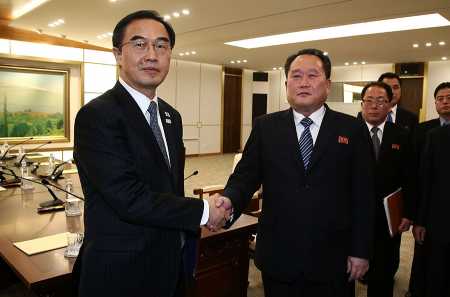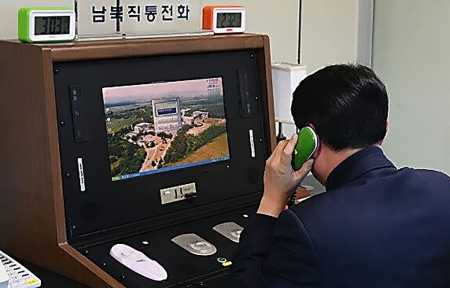“We continue to count on the valuable contributions of the Arms Control Association.”
North Korea Holds Talks With Seoul
January/February 2018
By Kelsey Davenport
North Korean leader Kim Jong Un opened the door for talks with South Korea in his annual New Year’s address while warning the United States that North Korea’s nuclear arsenal should deter Washington from starting “an adventurous war.”
 Although talks between North Korea and South Korea have the potential to reduce tensions and lead to further communications, an improved relationship between the two countries could stress the U.S.-South Korean alliance and put Seoul and Washington at odds over the strategy on dealing with Pyongyang’s nuclear program.
Although talks between North Korea and South Korea have the potential to reduce tensions and lead to further communications, an improved relationship between the two countries could stress the U.S.-South Korean alliance and put Seoul and Washington at odds over the strategy on dealing with Pyongyang’s nuclear program.
U.S. officials were quick to point out that addressing the threat posed by the North’s ongoing nuclear weapons development, including an intercontinental ballistic missile (ICBM) capable of striking as far as New York and Washington, is the dominant issue for the United States. Kim, in his address, said his country would continue and even accelerate production of nuclear warheads and missiles in 2018, leaving U.S. officials skeptical about his new overture to South Korea.
“We won't take any of the talks seriously if they don't do something to ban all nuclear weapons in North Korea,” Nikki Haley, the U.S. ambassador to the United Nations, said on Jan. 2. “We consider this to be a very reckless regime, we don't think we need a Band-Aid, and we don't think we need to smile and take a picture.”
The Trump administration has worked to tighten international sanctions on North Korea to increase diplomatic leverage, even as reports surfaced of Chinese and Russian entities covertly supplying oil to North Korea. President Donald Trump has said he is disappointed that China has not done more to force North Korea to curtail its nuclear activities.
In his Jan. 1 remarks, Kim wished South Korea success with hosting the Winter Olympics and offered to send a delegation of athletes to participate in the event. He said that authorities from the two countries “may meet together soon” to discuss the details, a shift from past responses that largely ignored South Korean President Moon Jae-in’s calls for dialogue since Moon’s election in May.
South Korea responded the next day with an offer to talk, and the two sides met Jan. 8 at the border town of Panmunjom. To facilitate a meeting, North Korea restored a hotline between the two countries that it shut down nearly two years ago when South Korean President Park Geun-hye closed a joint industrial complex.
 In his remarks, Kim seemed to be implying that the North and South could work together to reduce tensions while casting the United States as a warmongering country that threatened the peninsula. Kim said in his speech that the United States is “wielding the nuclear stick and going wild for war” and that “when the north and the south are determined, they can surely prevent the outbreak of war and ease tension on the Korean peninsula.” He further called for “improved inter-Korean relations” in order to “avoid acute military confrontation.”
In his remarks, Kim seemed to be implying that the North and South could work together to reduce tensions while casting the United States as a warmongering country that threatened the peninsula. Kim said in his speech that the United States is “wielding the nuclear stick and going wild for war” and that “when the north and the south are determined, they can surely prevent the outbreak of war and ease tension on the Korean peninsula.” He further called for “improved inter-Korean relations” in order to “avoid acute military confrontation.”
Any talks between Pyongyang and Seoul are unlikely to focus on North Korea’s nuclear program, but decreased tensions between the two countries might lessen South Korean support for the current U.S. pressure-based approach, particularly if the Trump administration continues to increase tensions.
White House spokesperson Sarah Sanders did not directly respond to a question about whether the United States supports South Korea’s decision to engage in dialogue, but said on Jan. 2 that U.S. policy toward North Korea has not changed and Washington “will still continue to put maximum pressure on North Korea to change and make sure that it denuclearizes the peninsula.”
Trump tweeted on Jan. 2 about Kim’s offer for talks with South Korea, saying “perhaps that is good news, perhaps not—we will see!”
Although this was not overtly negative, Trump adopted a more belligerent tone toward North Korea later in the day when he responded to Kim’s reference to having a “nuclear button” on his desk and weapons that can strike the entire U.S. mainland. Trump tweeted that he too has a nuclear button that is “much bigger and more powerful” than Kim’s and that his button works.
Further, the Trump administration may oppose South Korea conceding too much to North Korea to ensure stability during the Winter Olympics, set for Feb. 9-25.
Seoul expressed an interest in postponing annual U.S.-South Korean military exercises that are normally held around the time of the Olympics to try and mitigate any provocations by North Korea in response.
After initial U.S. resistance to a delay, Trump agreed Jan. 4 to Moon’s request to postpone the joint military exercises until after the Olympics. Moon asked for the delay so South Korea can focus on “ensuring the security” of the games, according to a White House statement. It is unclear whether Trump agreed for that reason, or whether his administration saw the move as a way to reduce tensions with Pyongyang.
Trump has consistently undermined signals from Secretary of State Rex Tillerson that the United States is willing to talk to North Korea, and a number of U.S. officials have sent mixed messages about the actions Pyongyang would need to take for Washington to start talks.
Tillerson said on Dec. 12 at the Atlantic Council that the United States is “ready to talk anytime North Korea would like to talk” and willing to “have the first meeting without precondition.” The White House quickly walked back Tillerson’s comment, saying on Dec. 13 that North Korea must refrain from provocations and take “sincere and meaningful actions toward denuclearization” before talks can begin.
Kim indicated that North Korea intended to continue its nuclear and missile activities in 2018. He described “perfecting the national nuclear forces” over the past year as “an outstanding success.” Kim said the country would emphasize the mass production of nuclear warheads and missiles to “spur the efforts for deploying them for action.”
In line with the U.S. strategy, the UN Security Council unanimously passed a new sanctions resolution Dec. 22 in response to North Korea’s Nov. 29 ICBM test (see page 30). North Korea is prohibited from conducting missile launches by previous Security Council resolutions.
Resolution 2397 further reduced the amount of refined petroleum products that North Korea can legally purchase and bans additional North Korean exports, including food and agricultural products. The resolution requires states to seize illicit goods on ships caught evading sanctions and to expel North Korean workers by the end of 2019.
Haley said on Dec. 22 that “leveling these unprecedented sanctions is a reflection of the international outrage” over North Korea’s actions. She said the measures in the resolution “cut deeper” and reiterated the U.S. call for all states to“sever diplomatic and trade relations with North Korea.”
